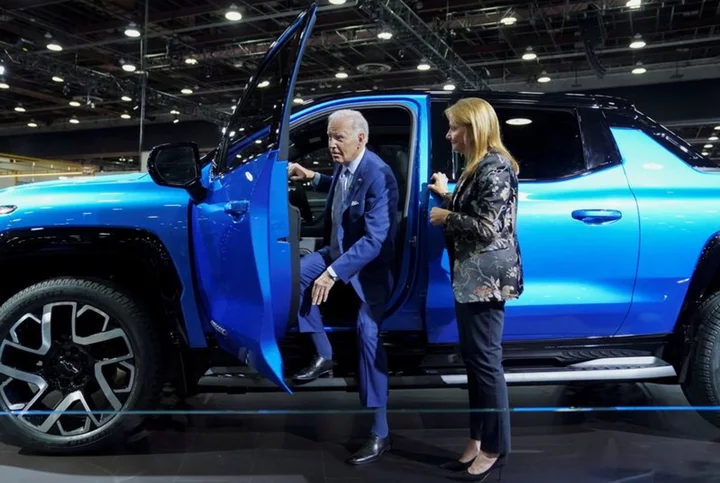By Nandita Bose
WASHINGTON As the UAW strike enters its fifth day, the Biden administration is hobbled by any lack of legal authority to steer the talks and struggling to figure out UAW President Shawn Fain's negotiating strategy or getting a clear read on his leadership style, three sources said.
The Biden White House is having discussions about ways to blunt any economic fallout from an extended auto workers strike, the sources said, as U.S. officials acknowledge they have a limited role to play in talks between General Motors, Ford and Chrysler-owner Stellantis and the union.
Top administration officials have held multiple calls with union leaders, Michigan lawmakers, company executives, suppliers, outside labor advisers and economists in the run-up to the strike to discuss aid for workers, suppliers and the local state economy, while both parties continue negotiations, one of the sources said.
The White House has started an "inter-agency process" to study the economic implications of the strike, with a focus on workers, said a fourth source familiar with the matter, who described the process as "routine."
The White House and the administration have discussed "mitigation efforts" in the event of a full work stoppage, not in response to the actions taken by the union currently, two sources said.
White House spokesperson Robyn Patterson said "no decision has been made" on offering aid or lessening the economic impact.
On Friday, Biden sided clearly with the union, telling automakers to concede more to workers who walked off the job at Detroit's largest car companies and share record profits fairly, and said he would dispatch two of his top officials to Detroit to support both sides in the negotiations.
But he was rebuked by UAW's Fain, who said "this battle is not about the President," and the two officials, Gene Sperling, and acting Labor Secretary Julie Su, were still in Washington as of Monday evening.
A White House official said "their goal is not to intervene or to serve as mediator but to help support the negotiations in any way both parties feel is constructive."
"Nobody has a read on Fain," said Art Wheaton, director of labor studies at Cornell University's School of Industrial & Labor Relations. "He's not just a stranger to the Biden administration but was a stranger to the all of the big three," he said, referring to the automakers.
Fain has led the UAW for less than six months.
Fain, whose union has yet to endorse any presidential candidate for 2024, has also rejected Republican Donald Trump's entreaties.
"Every fiber of our union is being poured into fighting the billionaire class and an economy that enriches people like Donald Trump at the expense of workers," Fain said, after Trump said he would come to Detroit to speak on Sept. 27.
AID FOR SUPPLIERS, MICHIGAN?
Top officials such as the Deputy Director of the National Economic Council Joelle Gamble has held calls with auto suppliers recently, the sources said.
Aid for suppliers has been thrown around "since the minute it became clear there could be a strike" but those talks are "premature and fluid," one of the sources said.
The White House believes the biggest 'Tier-1' suppliers will still be able to weather the storm, but smaller companies on the supply chain will struggle if the strike lasts more than six to eight weeks, one of the sources said.
The US strike could slow an outperforming U.S. economy should it drag on - even risking the first monthly net drop in payroll employment in nearly three years - but is unlikely on its own to trigger a recession, economists say.
Pushing original equipment manufacturers to ramp up production and lessen the impact on the country's supply chains has also been discussed by industry on these calls, two sources said.
The White House has also been discussing with Michigan lawmakers ways to limit the impact a strike would have on the state's economy, which has suffered from rising transportation costs, wage inflation and Covid, the sources added.
Among the concerns discussed were job losses and layoffs, drop in personal income, lower tax revenue for the state, demand for electric vehicles and how wage gains must keep pace with inflation, the sources said.
The economic fallout discussions didn't just start. White House chief of staff Jeff Zients had a conversation with the AFL-CIO's executive council at its headquarters in July to discuss "core labor issues" and what the administration can do to support workers, one of the sources said. A spokesperson for the AFL-CIO did not comment.
Besides Sperling, Su, Gamble and Zients, top White House officials involved in the effort include National Economic Council Director Lael Brainard, Deputy Chief of Staff Jen O'Malley Dillon and Counselor to the President Steve Ricchetti.
(Reporting by Nandita Bose in Washington, Additional reporting by David Shepardson. Editing by Heather Timmons and Nick Zieminski)

